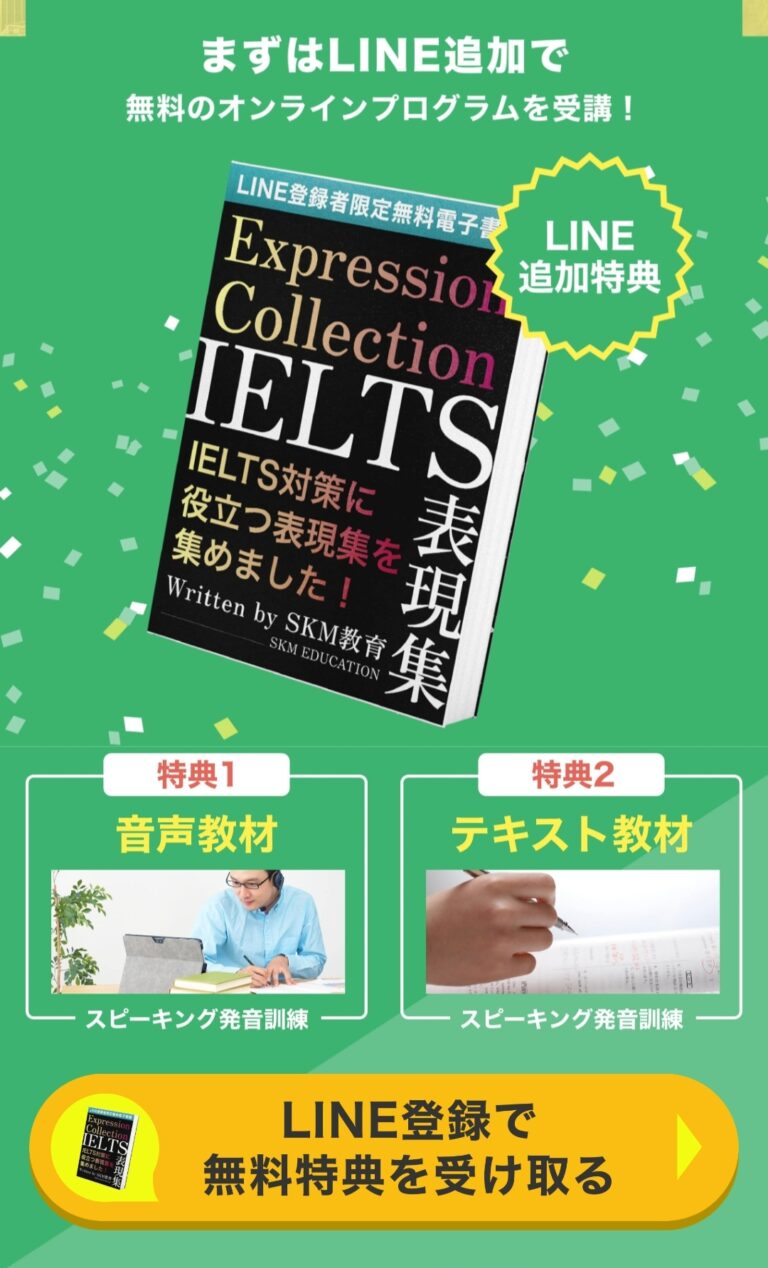こんにちは。SKです。
今回の記事は
〜エッセイで知らぬ間に口語表現を使ってませんか?〜
IELTSエッセイで減点されるインフォーマルな表現と正しいフォーマルな表現
についてジャンル別にまとめました!
英語でエッセイを書いていて、こんなことってありませんか??
「とりあえず文字を埋めるので精一杯で口語を書いてしまう」
「そもそも、エッセイに相応しいフォーマルな表現が分からない」
「IELTSのライティングのスコアが上がる気がしない」
私もIELTSを初めて受けた最初の半年間は同じ悩みを抱えてました、、

いくら単語を覚えても、いくら過去問とその回答を丸暗記しても、本番では表現に統一感がなくカジュアルな表現ばかり使ってしまってました
その結果、最初の半年くらいはスコアが伸びず、ずっと5.0~5.5を彷徨ってました
しかし、ちょっとずつエッセイにふさわしいフォーマルな表現を覚えて意識的に書き始めたところ、変化が起き始めました
フォーマルな表現で統一感を出すと、見栄えもきっちりとしたエッセイっぽくなりましたし
全体の流れや書きたいアイディアもそれに従って改善されました
その後順調にスコアが6.0⇨6.5⇨7.0という階段を上がって行きました!
今回のテクニックは、IELTSだけではなくその後の留学生活でも必ず役立つので絶対に最後まで読んでください!
はじめに

IELTSのライティングタスク2でスコアをアップさせるためのフォーマルな表現をカテゴリ別に紹介します。
タスク2はアカデミックモジュールと一般トレーニングモジュールのいずれでも同様に適用できます。
以下は一般的なトピックカテゴリに関連する表現です。
エッセイで使える・カテゴリ別フォーマルな書き方一覧
- 理由を表現する:
- “One significant reason for this is…”
- “This can be attributed to…”
- “There are several factors contributing to this phenomenon.”
- “A key factor to consider is…”
❌口語的な表現
This is because~
One reason for this is that などなど
- 逆説を表現する:
- “However, it is important to consider the opposite perspective.”
- “Contrary to this belief…”
- “Despite the apparent advantages, there are also disadvantages to consider.”
- 例を挙げる:
- “For instance,…”
- “A prime example of this is…”
- “To illustrate this point,…”
❌口語的な表現
“To give you an idea ~”
“Let’s say,”
“To show you what I mean”
- 強調する:
- “It should be noted that…”
- “It is imperative to emphasize that…”
- “Furthermore, it is worth highlighting that…”
❌口語的な表現
“To point this idea up, ~”
“To make this clear”
“To put emphasis on this opinion, ~”
- 比較する:
- “In comparison to…”
- “Likewise, similarly…”
- “On the contrary…”
*Likewiseはフォーマルとインフォーマル両方のシチュエーションで使えます
<Formal>
He opposed to the new company policy. His colleagues did likewise.
<Informal(口語)>意味:私も同じ気持ちです/あなたもね
“It’s nice to meeting you.”(あなたに会えて嬉しいです。)
”Likewise.”私もです
- 結論を導く:
- “In conclusion, it can be inferred that…”
- “To sum up, the evidence suggests that…”
- “In summary, it is clear that…”
- 個人の意見を表現する (ただし、ライティングタスク2では個人的な意見は慎重に扱うべきです)
- “From my perspective,…”
- “In my view,…”
- “I tend to believe that…”
❌口語的な表現
I think ~
In my opinion
- 強調する (重要性を示す):
- “Crucially, it is essential to…”
- “Significantly, this issue impacts…”
日本人受験者がライティングで書きがちな表現と正しい表現

- 気持ちを表す言葉やフレーズと正しい言い換え
- “I think…” →代わりに “It is believed that…”
- “I believe that…” → “Many experts argue that…”
- “I like…” → “I have a preference for…”
- “I don’t like…” → “I have a strong aversion to…”
- “I’m gonna…” → “I am going to…”
- 口語表現:
- “Stuff” → 代わりに “Items” または “Objects”
- “Thing” → “Entity” または “Phenomenon”
- “A lot of” → “Many” または “Numerous”
- “Get” (例: “get a job”) → “Acquire” または “Secure” (例: “secure employment”)
- “You” (例: “When you visit…”) → “One” または “Individuals” (例: “When one visits…”)
- 短縮系
- “Can’t” → 代わりに “Cannot”
- “Isn’t” → “Is not”
- “Don’t” → “Do not”
- “Won’t” → “Will not”
- “I’ve” → “I have”
- 口語的な感情表現とフォーマルな書き方
- “I’m thrilled about…” → 代わりに “I am enthusiastic about…”
- “I’m so happy” → “I am quite pleased”
- “I’m really angry” → “I am deeply upset”
- “It makes me sad” → “It evokes a sense of sorrow”
- 一人称視点→から三人称へ
- “I asked my friend, and he said…” → 代わりに “Inquiries were made, and it was reported that…”
- “So, what do you think?” → “Therefore, it is necessary to consider…”
- “I, personally, believe that…” → “From a personal standpoint, one may argue that…”
- 簡潔でない表現
- “I mean, like, you know…” → 代わりに “In other words…”
- “You can kinda see that…” → “It is somewhat evident that…”



